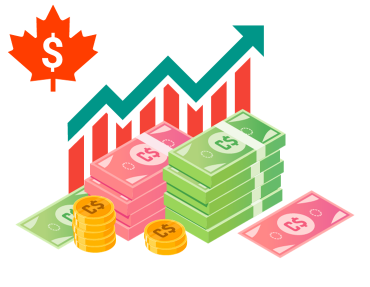As a journalist, it is my duty to inspire curiosity and provide insights into topics that matter to our readers. In this article, we delve into the world of foreign exchange rates and explore the relationship between the Canadian Dollar (CAD) and the British Pound (GBP). We will provide an overview of both currencies, examine the factors that influence their exchange rate, and take a look at historical trends in CAD to GBP exchange rates. Additionally, we will explore various options for converting CAD to GBP and share tips on how to maximize your money when exchanging currencies. Finally, we will also attempt to predict what the future holds for CAD to GBP exchange rates. Join us as we unravel the complexities of this fascinating topic.
The Canadian Dollar: An Overview
The Canadian dollar, or CAD, is the official currency of Canada. It is also known as the loonie, named after the bird depicted on the one-dollar coin. The Canadian dollar is the fifth most held reserve currency in the world, and it is widely traded on global foreign exchange markets. The Bank of Canada is responsible for issuing and controlling the circulation of Canadian banknotes and coins. The value of the Canadian dollar fluctuates based on various economic factors such as interest rates, inflation, and international trade. The Canadian economy is heavily dependent on its natural resources, particularly oil and gas exports, which have a significant impact on the value of the Canadian dollar. The Canadian dollar has a close relationship with the US dollar due to their strong economic ties and proximity. The two currencies are often compared, and fluctuations in one can affect the other. Overall, the Canadian dollar is considered a stable and reliable currency in the global market, with a relatively low inflation rate and a strong banking system. However, its value can be influenced by external factors such as political instability or global economic events. Understanding the fundamentals of the Canadian economy and its impact on the value of the CAD is essential for anyone looking to invest or trade in CAD-denominated assets.
GBP: A Brief Introduction
The GBP, or Great British Pound, is the official currency of the United Kingdom. It is also known as the pound sterling or simply the pound. The pound is one of the oldest currencies in the world, with a history dating back over 1,200 years. Today, it is one of the most widely traded currencies in the world, and is considered to be one of the most stable and secure currencies available. The Bank of England is responsible for issuing new banknotes and coins in the UK, which are used throughout England, Scotland, Wales and Northern Ireland. The pound is also used as a reserve currency by many central banks around the world. The symbol for the pound is £, and it is divided into 100 pence. One of the unique features of the pound is that it has no fixed exchange rate against other currencies, meaning its value can fluctuate on a daily basis depending on various economic and political factors. Despite this, it remains a popular choice for investors and traders due to its reputation for stability and reliability. Overall, the GBP plays an important role in global finance and continues to be a key player in international trade and commerce.
Factors Affecting the CAD to GBP Exchange Rate
There are several factors that affect the CAD to GBP exchange rate, including economic indicators, political events, and market sentiment. One of the most significant factors is the balance of trade between Canada and the UK. When Canada exports more goods and services to the UK than it imports, there is a higher demand for CAD, which can increase its value relative to GBP. Conversely, when Canada imports more than it exports, there may be a decrease in demand for CAD, leading to a lower exchange rate. Another key factor is interest rates set by central banks. When the Bank of Canada raises interest rates, it can attract foreign investment and strengthen CAD against other currencies, including GBP. Similarly, changes in UK interest rates can also affect the exchange rate. Political events can also have a significant impact on exchange rates. For example, uncertainty surrounding Brexit negotiations has led to volatility in GBP exchange rates. In addition, economic indicators such as inflation rates, GDP growth, and employment levels can influence exchange rates by affecting investor confidence in a country’s economy. Finally, market sentiment can play a role in exchange rate fluctuations. If investors perceive a country’s economy as stable and growing, it can lead to increased demand for its currency and a higher exchange rate. On the other hand, negative sentiment can lead to a decrease in demand and a lower exchange rate.
Historical Trends in CAD to GBP Exchange Rates
Historical trends in CAD to GBP exchange rates reveal a lot about the economic relationship between Canada and the United Kingdom. Since the 1970s, the Canadian dollar has had a volatile exchange rate against the British pound. In the 1970s, the CAD was relatively weak against the GBP, with an average exchange rate of around 0.35 GBP to 1 CAD. However, this changed in the early 1980s when the CAD strengthened significantly, reaching an average exchange rate of 0.8 GBP to 1 CAD in 1985. This was largely due to rising oil prices and strong economic growth in Canada.
The late 1990s saw another significant shift in CAD to GBP exchange rates. The Canadian dollar weakened considerably against the British pound, with an average exchange rate of 0.47 GBP to 1 CAD in 2002. This was partly due to a decline in commodity prices and a slowdown in the Canadian economy. However, since then, the CAD has recovered somewhat, with an average exchange rate of around 0.60 GBP to 1 CAD in recent years.
Overall, historical trends suggest that CAD to GBP exchange rates are highly dependent on economic factors such as commodity prices, interest rates, and economic growth. As such, it can be difficult to predict future trends in this currency pair. However, keeping an eye on economic indicators and staying informed about global events can help individuals and businesses make more informed decisions about converting CAD to GBP or vice versa.
How to Convert CAD to GBP: Exploring Your Options
When it comes to converting CAD to GBP, there are several options available. The most common method is to use a bank or foreign exchange broker. Banks typically charge a higher fee for currency exchange, but they offer the convenience of being able to exchange money in person or online. Foreign exchange brokers, on the other hand, specialize in currency exchange and often offer better exchange rates than banks. However, it’s important to research and compare different brokers before choosing one to ensure that you’re getting the best rate possible.
Another option for converting CAD to GBP is to use a prepaid travel card. These cards allow you to load money onto them in Canadian dollars and then convert them to British pounds when you need them. They often offer competitive exchange rates and lower fees than banks or foreign exchange brokers. However, be aware that some cards may have hidden fees or restrictions on where they can be used.
If you’re travelling to the UK, you may also be able to convert CAD to GBP at an airport or currency exchange booth. While this option offers convenience, it’s important to note that these booths often charge higher fees and offer less favorable exchange rates than other options.
Ultimately, the best way to convert CAD to GBP depends on your individual needs and preferences. Consider factors such as exchange rates, fees, and convenience when deciding which method is right for you. Regardless of which option you choose, it’s always a good idea to research and compare different providers before making a decision.
Maximizing Your Money: Tips for Getting the Best Exchange Rate
Maximizing your money when exchanging CAD to GBP is important to get the best value for your currency. Firstly, it is recommended to compare exchange rates from various providers such as banks, online exchange services and currency exchange offices. Online exchange services generally offer better rates due to lower overhead costs. Secondly, try to avoid exchanging currency at airports or hotels as they typically offer less favourable rates. Thirdly, consider exchanging larger amounts of money at once as many providers offer better rates for larger transactions. However, be cautious not to carry large sums of cash while travelling. Fourthly, timing is key when exchanging currency. Keep an eye on the current market trends and exchange when the rates are in your favour. Lastly, it is important to understand the fees and commissions charged by the provider. Some may offer better exchange rates but charge higher fees which can offset any potential savings. Therefore, always calculate the total cost of the transaction including all fees and commissions before making a decision. In conclusion, by comparing exchange rates, avoiding airports and hotels, exchanging larger amounts at once, timing the exchange and understanding the fees and commissions charged, you can maximize your money when exchanging CAD to GBP.
What Does the Future Hold for CAD to GBP Exchange Rates?
The future of CAD to GBP exchange rates is uncertain and subject to various factors. One of the primary factors that could impact the exchange rate is the economic performance of Canada and the UK. The Bank of Canada has projected a growth rate of 6.5% for 2021, which is higher than the projected growth rate of 4% for the UK. However, the uncertainty surrounding Brexit negotiations and the potential for a no-deal outcome could negatively impact the UK economy and the GBP. Another factor that could affect CAD to GBP exchange rates is commodity prices, particularly oil prices as Canada is a significant oil exporter. Any fluctuations in oil prices could impact the Canadian economy and subsequently, the CAD exchange rate. Similarly, any changes in global demand for commodities could also have an impact. Finally, geopolitical events such as trade tensions and political instability could cause volatility in currency markets and impact CAD to GBP exchange rates. Overall, while it is difficult to predict with certainty what the future holds for CAD to GBP exchange rates, monitoring economic performance, commodity prices, and geopolitical events can provide insights into potential trends. Additionally, seeking expert advice on currency exchange options can help individuals and businesses navigate any potential changes in exchange rates to maximize their money.
As we come to the end of our exploration of CAD to GBP exchange rates, it is clear that this topic is complex and multifaceted. Understanding the factors that affect exchange rates can help individuals and businesses make informed decisions about currency conversion. Historical trends can provide insight into what may happen in the future, but it is important to remember that no one can predict exchange rates with complete accuracy. Exploring different options for converting CAD to GBP and seeking out the best exchange rate can help maximise your money. Looking to the future, there are many uncertainties and potential events that could affect exchange rates, such as political developments or global economic conditions. It is important to stay informed and be prepared for fluctuations in the CAD to GBP exchange rate. As always, knowledge is power, and staying informed can help us navigate this ever-changing landscape of international finance.






Leave a Reply